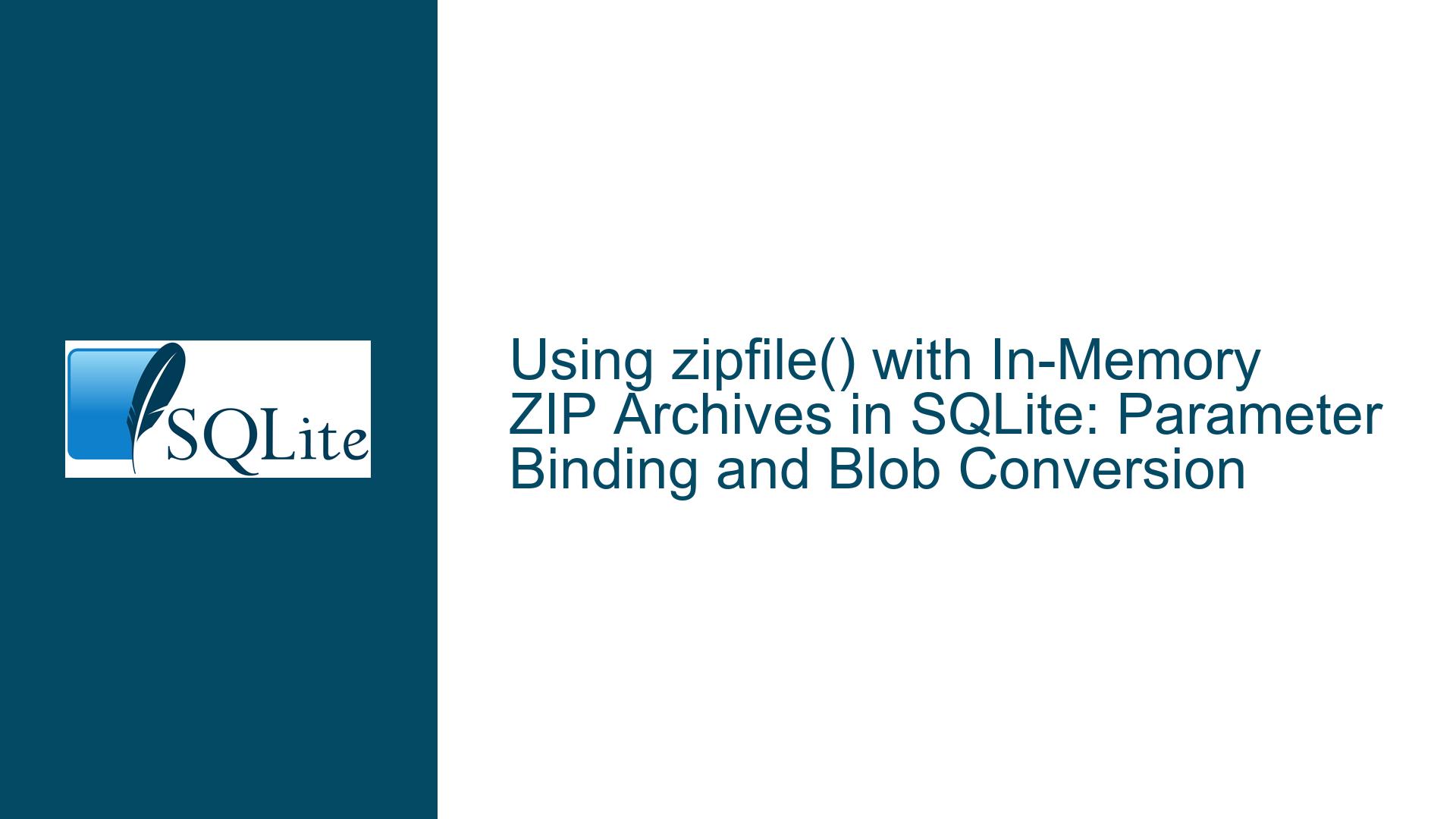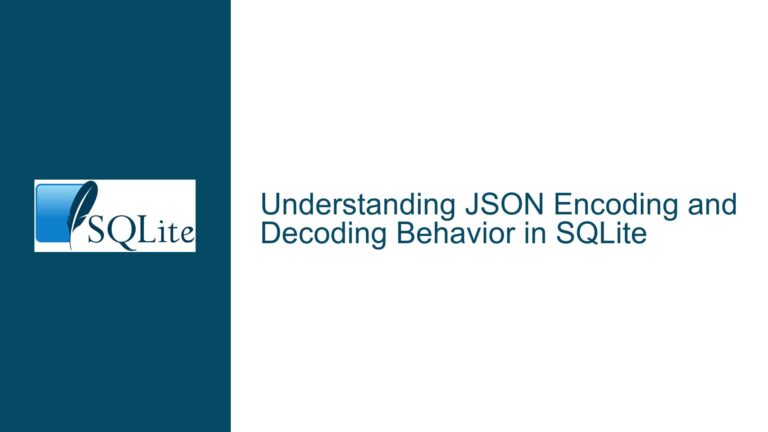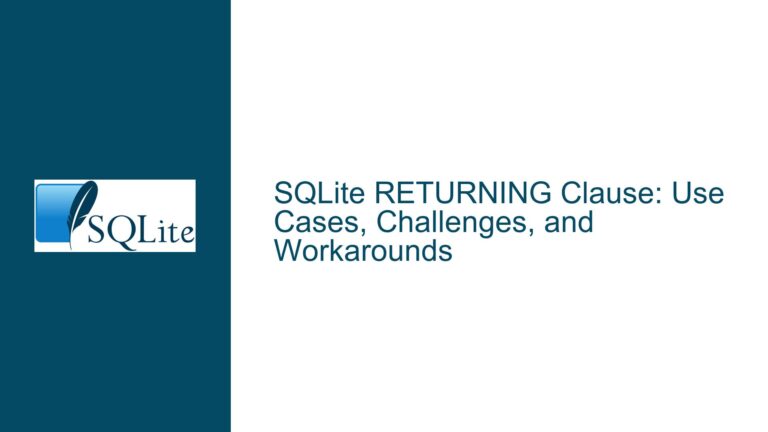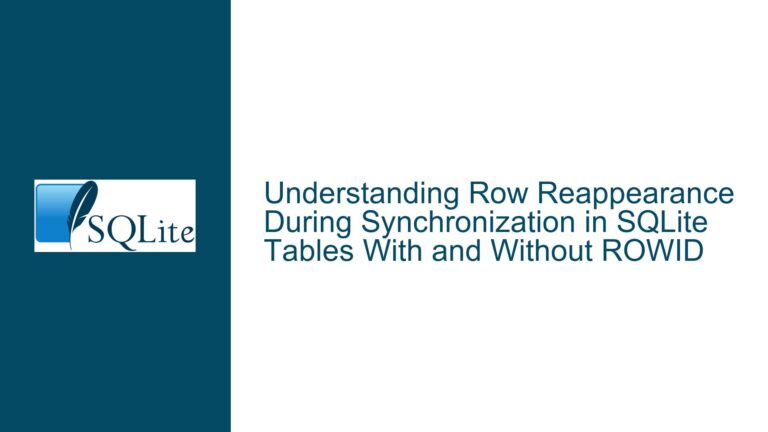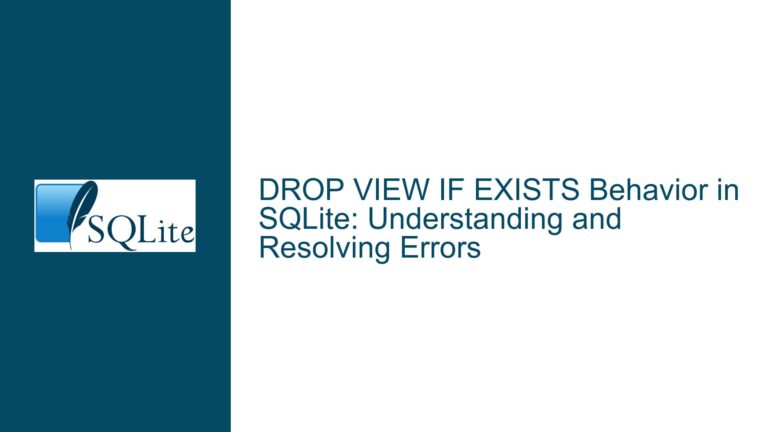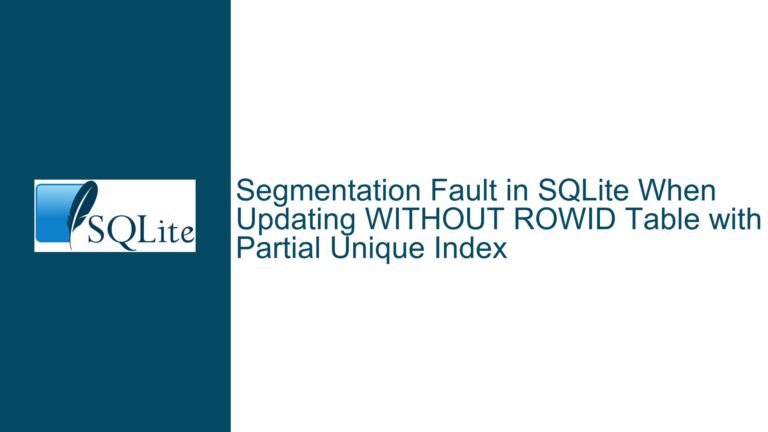Using zipfile() with In-Memory ZIP Archives in SQLite: Parameter Binding and Blob Conversion
Understanding zipfile() Parameter Handling and In-Memory Archive Access
Issue Overview: zipfile() Function Behavior with TEXT vs. BLOB Parameters
The zipfile() table-valued function in SQLite allows querying ZIP archives stored on disk or in memory. A common challenge arises when developers attempt to pass raw ZIP archive data (as opposed to a file path) to zipfile(). The function behaves differently depending on whether the input parameter is bound as TEXT (interpreted as a filename) or BLOB (interpreted as raw archive bytes).
Key observations from the discussion include:
- Parameter Type Sensitivity:
zipfile('filename.zip')treats the argument as a file path (TEXT).zipfile(readfile('filename.zip'))treats the argument as raw archive data (BLOB).
- Binding Methods Matter:
- Using
sqlite3_bind_text()with ZIP data will fail because SQLite interprets the bound value as a filename, not raw bytes. - Using
sqlite3_bind_blob()correctly passes the ZIP data for parsing.
- Using
- Casting Ambiguities:
- Attempts to cast a TEXT parameter to BLOB (e.g.,
zipfile(cast(? as BLOB)) may fail if the bound text contains embedded NULL bytes or encoding mismatches. - The
length()function behaves differently for TEXT (stops at first NULL byte) and BLOB (counts all bytes), complicating validation.
- Attempts to cast a TEXT parameter to BLOB (e.g.,
Possible Causes of zipfile() Misbehavior with In-Memory Data
1. Incorrect Parameter Binding Type
- Binding ZIP Data as TEXT: If an application binds raw ZIP bytes using
sqlite3_bind_text(), SQLite treats the value as a filename. This leads to errors like "cannot find end of central directory record" because the function attempts to read a non-existent file named after the raw bytes. - Implicit Type Conversions: Some language APIs (e.g., Python’s
sqlite3module) may auto-convert binary data to TEXT, stripping NULL bytes or altering the payload.
2. Embedded NULL Bytes in TEXT Parameters
- Truncation During Casting: When casting a TEXT parameter to BLOB (
cast(? as BLOB)), SQLite preserves the byte sequence only if the TEXT value was bound with explicit length information. If the binding omits the length (relying on NULL termination), embedded NULL bytes truncate the data prematurely. - API-Specific Handling: In languages like Python, passing a
bytesobject as a parameter may implicitly bind it as BLOB, but passing astr(even with UTF-8 encoding) risks data corruption.
3. SQLite Version-Specific Behavior
- Legacy Issues in Older Versions: SQLite versions prior to 3.36.0 (2021-06-18) had stricter handling of BLOB casts. For example,
CAST(x'AB00CD' AS TEXT)in version 3.35.5 might return an empty string if the first byte is NULL (x'00...'), whereas newer versions preserve the full byte sequence.
4. Misuse of SQL Functions
- Confusion Between
readfile()and Literals: Usingreadfile('archive.zip')returns a BLOB, but constructing a BLOB literal (e.g.,x'504B0304...') requires hexadecimal formatting. Mismatches here lead to parsing failures. - Dynamic ZIP Generation: Queries like
SELECT zipfile('foo', 'bar')generate an in-memory ZIP archive. However, passing this result directly to anotherzipfile()call requires explicit casting or intermediate storage to preserve the BLOB type.
Troubleshooting Steps, Solutions, and Fixes
Step 1: Validate Parameter Binding Methods
Problem: ZIP data is bound as TEXT instead of BLOB.
Solution:
- Explicit Blob Binding:
// C API example const char* zip_data = ...; // Raw ZIP bytes int zip_size = ...; // Size of ZIP data sqlite3_stmt* stmt; sqlite3_prepare_v2(db, "SELECT * FROM zipfile(?)", -1, &stmt, NULL); sqlite3_bind_blob(stmt, 1, zip_data, zip_size, SQLITE_STATIC); - Language-Specific Examples:
- Python:
with open('archive.zip', 'rb') as f: zip_blob = f.read() cursor.execute("SELECT * FROM zipfile(?)", (zip_blob,)) # Pass as BLOB - Java (JDBC):
byte[] zipData = Files.readAllBytes(Paths.get("archive.zip")); PreparedStatement stmt = conn.prepareStatement("SELECT * FROM zipfile(?)"); stmt.setBytes(1, zipData);
- Python:
Verification:
- Query
typeof(?)to confirm the parameter is bound as BLOB:SELECT typeof(?); -- Should return 'blob'
Step 2: Handle Embedded NULL Bytes in TEXT-to-BLOB Casts
Problem: Casting a TEXT parameter to BLOB (cast(? as BLOB)) truncates data at the first NULL byte.
Solution:
- Bind Directly as BLOB: Avoid casting altogether by using blob-specific binding methods.
- Use Hexadecimal Literals (for static data):
SELECT * FROM zipfile(x'504B030414000000...'); - Create a UDF for Safe Conversion (if binding as BLOB is impossible):
// Register a UDF to convert TEXT to BLOB sqlite3_create_function(db, "text_to_blob", 1, SQLITE_UTF8, NULL, [](sqlite3_context* ctx, int argc, sqlite3_value** argv) { const char* text = (const char*)sqlite3_value_text(argv[0]); int size = sqlite3_value_bytes(argv[0]); sqlite3_result_blob(ctx, text, size, SQLITE_TRANSIENT); }, NULL, NULL);SELECT * FROM zipfile(text_to_blob(?));
Verification:
- Check for data truncation using
length()andhex():SELECT length(cast(? as BLOB)), hex(cast(? as BLOB)); -- Compare with expected size and hex dump
Step 3: Debug Dynamic ZIP Generation and Recursive Queries
Problem: Using zipfile() to generate an archive and immediately querying it returns no results.
Solution:
- Materialize Intermediate Results:
-- Store generated ZIP in a temporary table CREATE TEMP TABLE temp_zip AS SELECT zipfile('foo', 'bar') AS data; SELECT * FROM zipfile((SELECT data FROM temp_zip)); - Explicit Casting:
SELECT * FROM zipfile(cast((SELECT zipfile('foo', 'bar')) AS BLOB));
Verification:
- Inspect the generated ZIP structure using
zipfile()itself:SELECT name, sz, hex(data) FROM zipfile((SELECT zipfile('foo', x'626172'))); -- Expected output: 'foo', 3, '626172'
Step 4: Address SQLite Version-Specific Quirks
Problem: Older SQLite versions mishandle BLOB casts or length() calculations.
Solution:
- Upgrade to SQLite ≥3.36.0: Ensures consistent handling of embedded NULLs in TEXT/BLOB conversions.
- Use
sqlite3_column_bytes()in C Code:sqlite3_column_bytes(stmt, 0); // Returns true BLOB size, ignoring NULLs
Verification:
- Test
length(cast(x'610062' as BLOB)):-- Returns 3 in SQLite ≥3.36.0, even if the BLOB contains x'610062'
Step 5: Diagnose "Cannot Find End of Central Directory Record" Errors
Problem: The ZIP parser fails to locate the archive’s metadata.
Causes:
- Truncated or corrupted ZIP data.
- Incorrect binding type (TEXT instead of BLOB).
- Embedded NULL bytes altering the byte stream.
Solution:
- Validate ZIP Integrity:
unzip -t archive.zip - Hex-Dump Bound Parameters:
SELECT hex(?) LIMIT 1; -- Compare with expected ZIP header (x'504B0304') - Use
readfile()for File-Based Debugging:SELECT * FROM zipfile(readfile('archive.zip')); -- Baseline test
By systematically addressing parameter types, avoiding unsafe casts, and validating data integrity, developers can reliably use zipfile() with in-memory ZIP archives. The root cause of most issues lies in SQLite’s strict differentiation between TEXT and BLOB parameters, necessitating precise binding techniques and awareness of embedded NULL byte handling.
